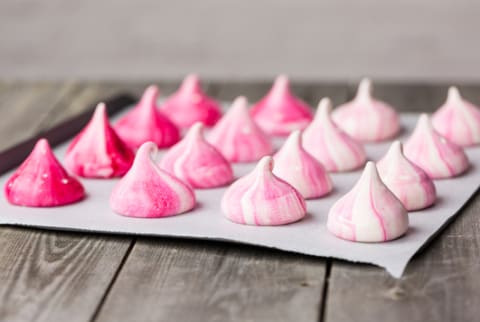Advertisement
Aquafaba: The Magical Vegan Ingredient You've Probably Been Throwing Out


The secret ingredient that can magically veganize our favorite foods (and drinks!) has been hiding in plain sight for so long—and we've just been dumping it down our drains.
Aquafaba is that murky, viscous liquid in canned chickpeas (and other beans) and can be used as an egg white alternative. I really wish there was a better word than "alternative" or "substitute," though, because those words downplay its uncanny ability to mimic the effects of egg whites. It doesn't compare to egg whites like beet burgers are to beef burgers; it's more like jackfruit is to pulled pork—but way less labor intensive.
Just like egg whites, aquafaba can act as an emulsifier, leavening agent, and foaming agent. Which means it can be used to make vegan versions of our favorite foods, from pasta to ice cream, waffles to mayonnaise, and a wide variety of baked goods, from cakes to meringues. Oh, and it also can be used to imitate the foam and silkiness of an egg white in cocktails like fizzes and sours.
You have to see it to believe it:
Who's the genius who discovered this unsightly liquid's crazy capabilities? Well, thanks to the Internet, it was a worldwide team effort.
Chickpea water's talent was first exposed two years ago, through work by American software engineer Goose Wohlt, drawing on experiments by French tenor Joel Roëssel that showed that vegetable foams, that liquid from beans and hearts of palm, can be coerced into a foam. Then Wohlt figured out how to make stable vegan meringue in a simple, accessible way and, likely to make "chickpea water" sound a bit more appetizing, coined the term "aquafaba." He shared his discovery on Facebook, and the vegan community began experimenting with and spreading the word about it.
During last year's wastED pop-up at Blue Hill in New York, chef Dan Barber whipped it into dressing for his "Dumpster-dive salad," and still uses in other dishes at his restaurants. And in the East Village, Mother of Pearl's bartenders use it instead of egg whites as a foam topping for cocktails like gin fizzes and pisco sours.
J. Kenji López-Alt of Serious Eats, the author of The Food Lab, writes after testing eggless mayonnaise, "in the world of vegan cuisine, nothing has shaken things up like aquafaba."
"Up until then, there weren't that many good substitutes, not that aquafaba is a complete, perfect egg substitute," he says. "But the idea of making a stable foam without an animal-based protein, that you can literally just buy at the supermarket for $.79 a can and whip up is pretty attractive."
The reason it's not a perfect replacement, López-Alt says, is because it lacks eggs' stability. Still, aquafaba's effects are shocking—when whipped, it can be smooth, luscious, and airy—though it remains unclear what exactly makes it work. (Magic, perhaps?)
Perhaps the most promising development for aquafaba in the mainstream market is the fact that this month, the condiment company Sir Kensington's is rolling out its own vegan mayonnaise substitute—called Fabanaise—that uses the ingredient instead of eggs. But will it succeed? Well, my hunch is, with more and more people clamoring for animal-protein substitutes now, there's a pretty good chance it will.
This discovery may revolutionize vegan baking. You can stop trying to whip up ground flaxseed, bananas, soy yogurt, tofu, or commercial egg substitutes into "stiff peaks." Keeping in mind that 3 tablespoons drained chickpea liquid (each can yields about ½ to ¾ cup) is the equivalent of about 1 egg, you can easily incorporate them into your favorite recipes right now.
For raw preparations, like fluffs, whips, mousses, ice creams, drink and pie toppings, just whip it with sugar until it forms stiff peaks. For airy baked goods, like meringues, macarons, and pavlovas, do the same thing, then either scoop it or pipe it onto a baking sheet and bake it as you normally would. And for sturdier baked goods such as cakes, brownies, and cookies, just add it to your batter as a binder before mixing in the flour, salt, and baking soda. And for confectionery like nougat, marshmallows, fudge, and icing, beat the brine until it forms stiff peaks, add a syrup made by boiling sugar, water, corn syrup. and salt, and carry on with the rest of your recipe.
It's pretty simple: Wherever you typically use egg whites, you can almost always use aquafaba. It's sorcery, I'm telling you.
Check out some more recipes and join the aquafaba revolution here.

Why Nutrition Is Key To Changing Your Relationship With Alcohol
Brooke Scheller, DCN, CNS

Why Alcohol Sabotages Your Gut Health & How To Get Back On Track
Brooke Scheller, DCN, CNS

Why Nutrition Is Key To Changing Your Relationship With Alcohol
Brooke Scheller, DCN, CNS

Why Alcohol Sabotages Your Gut Health & How To Get Back On Track
Brooke Scheller, DCN, CNS

Why Nutrition Is Key To Changing Your Relationship With Alcohol
Brooke Scheller, DCN, CNS

Why Alcohol Sabotages Your Gut Health & How To Get Back On Track
Brooke Scheller, DCN, CNS

Why Nutrition Is Key To Changing Your Relationship With Alcohol
Brooke Scheller, DCN, CNS

Why Alcohol Sabotages Your Gut Health & How To Get Back On Track
Brooke Scheller, DCN, CNS














